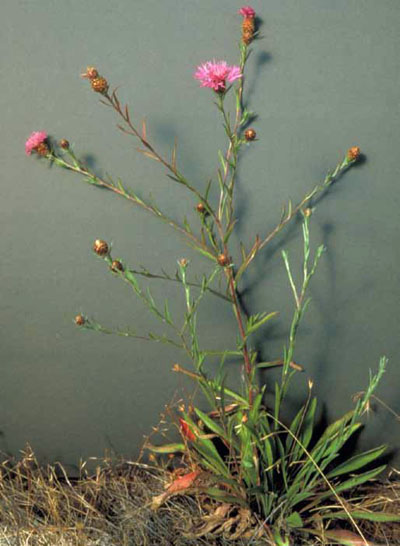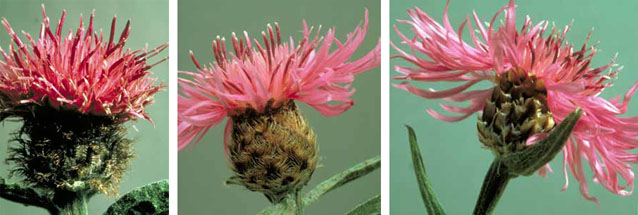Asteraceae (Sunflower family)
At a Glance

© Cindy Roche / Bugwood.org
- Perennial forb that grows 20-40 inches tall.
- Fertile hybrid of black and brown knapweeds (Centaurea nigra x Centaurea jacea).
- Stems are branched with one flowerhead at each tip.
- Leaves become progressively smaller up the stem. Lower leaves have smooth, lobed, or toothed edges, and upper leaves almost look like bracts.
- Pink to reddish-purple flowerheads with fringed bracts underneath.
- Fruit is a small, white to light brown, achene.
Habitat and Ecology
Meadow knapweed (Centaurea debeauxii ssp. thuillieri) is a fertile hybrid between black knapweed (Centaurea nigra) and brown knapweed (Centaurea jacea). Black knapweed was probably introduced to North America from ship ballast or as an ornamental. Brown knapweed was purposefully introduced to North America as a forage crop. Meadow knapweed is not very palatable to animals; therefore it easily outcompetes other forage species. Meadow knapweed prefers moist sites in full sunshine, infesting river banks, pipelines, roadsides, fields, and pastures. Once established, infestations of meadow knapweed are difficult to remove. Despite its invasive status, gardeners plant it as an ornamental or as a pollen source for honeybees. The taxonomic status of this species is uncertain.
Description
Meadow knapweed is a perennial forb that grows to 20-40 inches tall. The branched stems rise above a woody root crown. The seedlings have a tap root, but the mature plants develop a cluster of roots below the root crown. Meadow knapweed reproduces mostly by seed, but its root fragments can resprout after disturbance. The seeds naturally disperse only a few meters, but they can disperse further via animals, humans, vehicles, or water.
Leaves
The leaves become progressively smaller up the stem. The lower leaves can have either smooth, coarsely lobed, or toothed edges, and can grow to 6 inches long and 1.5 inches wide. The upper leaves tend to have smooth edges and are almost like bracts.
Flowers and Fruits
Pink to reddish-purple, or occasionally white, the flowers are larger and showier than the flowers of other knapweeds. The flowerheads are about the size of a nickel and are more rounded than the flowerheads of other knapweeds. A single flowerhead tips the end of each branch. Underneath the flowerhead are distinctive light to dark-brown bracts with papery, fringed margins.
The fruit is an achene (a dry fruit with a single seed and thin walls that does not open at maturity; for example, a sunflower “seed”). The achenes are 1/8 inch long, and they are ivory-white to light brown.
Etymology
Centaur’ea/Centaur’ium is a reference to the Centaur Chiron who supposedly discovered the medicinal uses of a plant in Greece that came to be called Centaury.
Similar Species

© Cindy Roche / Bugwood.org
A hybrid itself, meadow knapweed hybridizes with yellow starthistle (Centaurea solstitialis) and diffuse knapweed (Centaurea diffusa).
Control Methods
Possible control methods are explained at these websites:
References
Charters, M. L. 2009. California plant names: Latin and Greek meanings and derivations. Available at http://www.calflora.net/botanicalnames.
King County Noxious Weed Control Program. 2007. Meadow knapweed in Best Management Practices. King County Department of Natural Resources and Parks, Water and Land Resources Division, Seattle, WA. Available at http://your.kingcounty.gov/dnrp/library/water-and-land/weeds/BMPs/Meadow-Knapweed-control.pdf.
Prepared by Kelly Reeves, Southern Colorado Plateau Network Inventory and Monitoring Program, 2010.
Last updated: April 27, 2016
